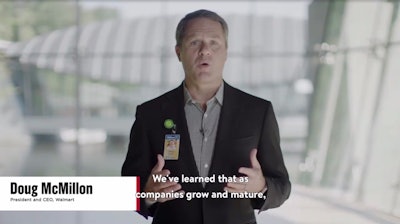Since 2005, when Walmart began leading the charge in sustainability, most of its efforts—as well as those of most eco-friendly-minded CPGs and retailers—have focused on maintaining systems without degrading them. At its Sustainability Milestone Summit in late September, Walmart committed itself to becoming a regenerative company, one that is dedicated to placing nature and humanity at the center of its business.
“Regenerating means restoring, renewing, and replenishing, in addition to conserving,” explained Walmart President & CEO Doug McMillon, in his opening address. “It means decarbonizing operations and eliminating waste along the production chain. It means adopting regenerative practices in agriculture, forest management, and fisheries, while advancing prosperity and equity for customers, associates, and people who participate in our product supply chain.”
See it Live at PACK EXPO Connects Nov. 9-13: Filling products with an Automatic Auger Filler, by Image Fillers, Inc. Preview the Showroom Here.
The one-hour virtual event featured a number of Walmart and Sam’s Club executives as well as prominent CPGs and environmental non-profits, who shared details on Walmart’s goals and projects moving forward in order to “draw carbon dioxide out of the environment and bring it home,” as McMillon explained.
Walmart’s commitment, McMillon noted, is in response to the building crisis that, if left unaddressed, will have disastrous consequences for everyone. “We have exceeded the planetary boundaries that sustain our natural environment,” he said. “Worldwide, environmental losses are cascading. …Our natural systems are changing, and what they’re telling us is that we’re not doing enough. We’re actually doing irreversible damage to our planet.
“…Science is clearly pointing to fossil fuel combustion as the primary cause of warming, and that we need to be even more aggressive in moving toward renewable forms of energy. …We’re facing a reality that says we need everyone, including those who passionately defend fossil fuels, to have at least as much passion to aggressively fund and support sustainable alternatives with urgency. Let’s stop debating the or, and get on with an urgent and strategy until we’ve innovated our way out of fossil fuels.”
Transforming the world’s supply chains
According to McMillon, transforming the world’s supply chains to become regenerative involves four critical areas: climate, nature, waste, and people.
As part of Walmart’s new commitments around climate, the company is raising its ambitions to achieve zero emissions in its global operations by 2040, without the use of carbon offsets. The levers it plans to pull to reach this goal include:
· Harvesting enough wind, solar, and other renewable energy sources to power its facilities with 100% renewable energy by 2035
· Electrifying and zeroing out emissions from all of its vehicles, including long-haul trucks, by 2040
· Transitioning to low-impact refrigerants for cooling and electrified equipment for heating in its stores, clubs, and data and distribution centers by 2040
Where nature is concerned, Walmart plans to help transition consumer product sourcing to a regenerative approach to help reverse nature loss and reverse global warming. “That’s why we, along with the Walmart Foundation, are committing to help protect, manage, and/or restore at least 1.5 million acres of land and one million square miles of ocean by 2030, related to ecosystems that produce food and other consumers products,” said McMillon.
It will accomplish this by:
· Continuing to support efforts to preserve at least one acre of natural habitat for every acre of land developed by the company in the U.S.
· Driving the adoption of regenerative agriculture practices, sustainable fisheries management ,and forest protection and restoration—including an expansion of Walmart’s forests policy
· Investing in and working with suppliers to source from place-based efforts that help preserve natural ecosystems and improve livelihoods
Added Kath McLay, President & CEO, Sam’s Club, later in the meeting, “Healthy forests sustain biodiversity. They also support livelihoods and absorb carbon, playing an integral role in combating climate change. But deforestation continues to occur at an alarming rate. Recent reports show we lost the equivalent of a soccer field of primary rainforest every six seconds last year. That’s why Walmart is taking a holistic approach to addressing deforestation, and we’re on track to achieve our zero-net deforestation goals to source certified, sustainable palm oil, pulp, and paper in our global private brands by the end of this year.
See related article: Live from the Walmart 2019 Sustainability Milestone Meeting
See related article: Walmart reignites ‘passion around packaging’
See related article: P&G Debuts Paper Deodorant Tube
“…As you can see, degradation of natural habitats and forests is very real. And while we’ve made progress in key areas, we recognize the need to raise our ambition. That’s why we’re expanding our forest goals by aspiring to source palm oil, beef, soy, pulp, and paper 100% deforestation-free by 2025. These efforts can support sustainable economies, biodiversity, and livelihoods, while helping meet our customers’ and members’ growing needs for sustainable food and products.
“…I challenge everyone to find ways to help protect, manage, and restore nature. Suppliers can start right now by deepening their engagement with the agriculture and forest pillars of Project Gigaton [a Walmart initiative to avoid 1 billion metric tons, or 1 gigaton, of GHGs from the global value chain by 2030], using new tools, guidance, and progress calculated on our sustainability hub. But don’t stop there. We need bold, creative action across the board in all forms. Together, we can do this, and we will.”
Additional highlights
Among other notable comments from the event:
· Fred Krupp, President, Environmental Defense Fund: “With every passing year, we lose options. The science demands action now. Business leaders should lead for two reasons. One, climate change is posing immense, immediate risks to businesses and financial markets. …The second reason is that stakeholders are demanding action.”
· Alan Jope, CEO, Unilever: “Look, consumers are demanding change. The majority of people now say they would change their consumption habits to reduce their environmental impact to their brand choices. And 81% of the people we speak to feel strongly that companies have a role to play in improving the environment. …the biggest impact we can make is to help shoppers to make informed choices that support environmental progress. Frankly, we would ask you to disproportionally support brands that promote sustainable lifestyles, where the packaging is 100% recycled and 100% recyclable, where products are sustainable design with low-impact sourcing and low-impact use instructions, where the brands are promoting responsible consumption, through their purpose and their partnerships. One of the next steps on our journey of decarbonizing our value chain will be to communicate our brands’ carbon footprint on-pack. We will label the carbon footprint in the same way that today we label nutritional and calorie information.”
See it Live at PACK EXPO Connects Nov. 9-13: Sustainable Film Solutions to Power a New Generation of Packaging, by Charter NEX Films, Inc. Preview the Showroom Here.
· Kath McLay, President & CEO, Sam’s Club: “Studies show nature provides us with services and resources worth around $125 trillion per year. Yet around 30% of agricultural land worldwide is degraded.”
· M. Sanjayan, CEO, Conservation International: “Now scientists tell us we need to protect about 30% of the planet. We’re nowhere near that. So we need to redouble our efforts to get there. The good news is that it’s really cost-effective. There’s a great new study, [Global scientific/policy consultant Anthony] Waldron is a key author on it. Hundreds of scientists and economists participated in the study. It showed that for every dollar you spend protecting nature, you get $5 of benefit back in return. So it’s a great return on investment. And that’s why Walmart and P&G, and others are partnering with Conservation International and other great conservation groups to jointly protect nature. It ultimately creates jobs, it protects our supply chains, and it honestly keeps us all safe.”
See it Live at PACK EXPO Connects Nov. 9-13: Optimize your productivity: Efficient filling and packaging machines with mix proof valves, by Alfa Laval, Inc. Preview the Showroom Here.
· David Taylor, CEO, Procter & Gamble: “The greatest impact we can have, really, is helping consumers with the small choices they make when they use our products and that can lead to big positive effects. Some of those changes happen when customers simply choose our products, such as Secret and Old Spice, with packaging that eliminates virgin plastic, which we launched in partnership with Walmart. One hundred percent of the fiber in our paper products is third-party certified as sustainably sourced by partners such as Forest Stewardship Council. We wanted to show the preservation of forests now and into the future, and ensure none of us has to choose between using the products we enjoy today, and what we all need to preserve our tomorrow.”
· Andrew Morlet, Chief Executive, Ellen MacArthur Foundation: “We’re very vocal about the fact that we think the circular economy is more relevant than ever, following the pandemic and perhaps for three reasons. One is that it’s really a bigger idea than just better recycling. The circular economy is really about solutions that give people better choices and also keep materials in use for longer and used more often, and that can be by design really way upstream. It’s not just thinking about what do we do with stuff once it ends up in a waste system or in a recycling system. How do we design products to be used differently, thought about differently? The other real interesting thing about the circular economy is it really represents an opportunity for better growth. There’s an enormous economic possibility here as we rethink how we can provide product service, solicit systems and solutions for people that take into account the materials in the economy, and how we keep them in use and in flow. And I think the third thing is that this is really an interesting idea because there is profit to be had in applying this thinking, and because it’s an idea that really speaks about economic opportunity. The scalability of it is, is really of interest as well. We can actually scale solutions here through organizations like Walmart and many of the others.”


























